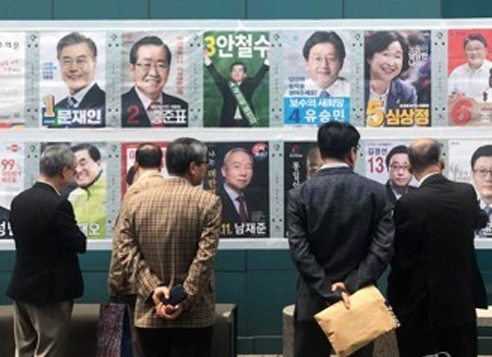The following are fast facts about South Korea's latest presidential election held Tuesday.

-- The person elected in Tuesday's election will serve the 19th presidential term since the country's foundation in 1948 but become only the 11th person to serve as the president.
The country's first president, Rhee Syng-man, served four consecutive terms following his first election in 1948, while his immediate successor Park Chung-hee served five terms over 19 years after coming to power through a military coup in 1961.
Former President Chun Doo-hwan served two presidential terms that lasted from 1980-1988. Those following Chun have been limited to single five-year terms under a 1987 constitutional amendment.
But most major candidates in the latest election have vowed to amend the Constitution to allow future presidents to be re-elected for an additional term.
-- Tuesday's election marked the first presidential by-election following an impeachment of a president.
Former President Park Geun-hye was removed on March 10, 2017, by a Constitutional Court ruling that upheld the parliamentary impeachment of her in late 2016 over a series of corruption allegations involving her longtime friend Choi Soon-sil.
-- Initially, 19 election hopefuls declared their run for president, registering their preliminary bids with the National Election Commission.
Only 15 of them registered their official candidacies, while two of them dropped out of the race later, leaving 13 final candidates.
-- The presidential election is estimated to have cost 311 billion won ($274 million) in taxpayers' money as the National Election Commission spent 180 billion won on its own expenses, along with 42.1 billion won paid in election support funds to five political parties with parliamentary seats.
The election watchdog also expects to pay an additional 88.9 billion won in partial or full cost reimbursements to all presidential candidates who secure 10 percent of all votes or more as required by the law.
-- Each presidential candidate could have spent up to 50.9 billion won for their campaigning in the lead-up to the election.
The National Election Commission will reimburse the entire amount to each and every candidate with more than 15 percent or more of all votes cast in the presidential election.
Those with less than 15 percent but more than 10 percent of the votes will be reimbursed half of their actual costs.
The payments will be made before July 18 or within 70 days following the election, and after the election watchdog verifies the legitimacy of all expenditures by each election campaign.
-- There are 42,479,710 eligible voters in the country, accounting for 82 percent of the total 51,716,959 population and marking the largest number of voters in any given election in the country's history.
-- An additional 1.97 million overseas South Koreans were eligible to vote in the presidential election.
Of them, 221,981 actually cast ballots, accounting for 11.2 percent of the total and marking a 40.3 percent spike from 158,225 overseas voters who took part in the country's last presidential election held in 2012.
-- The presidential election marked the first of its kind where early voting was allowed for eligible voters.
Over a two-day early voting period of May 4-5, 11,072,310 voters, or 26.06 percent of the total electorate, cast their ballots, also setting a record turnout in early voting that was first introduced here in 2014.
-- The 42.4 million ballots printed for the presidential election, when stacked, will stand 4,248 meters high.
-- A total of 485,700 people have and will have worked for the election, with 75,000 people required just to count the votes cast.
-- Official counting of votes took an average 4 hours and 40 minutes in the two previous presidential elections, a reduction of nearly 3 hours from 7 hours and 30 minutes it took to count all votes cast in the 15th presidential election held in 1997.
Such a reduction was made possible by the introduction of an electronic vote counting system in 2002.
-- The winner of the election will remain president-elect for the shortest time in the country's history as he or she will be inaugurated immediately following the official confirmation of victory by the election watchdog in a meeting expected to be held between 8 a.m. and 10 a.m. the next day. (Yonhap)


















![[Today’s K-pop] Treasure to publish magazine for debut anniversary](http://res.heraldm.com/phpwas/restmb_idxmake.php?idx=642&simg=/content/image/2024/07/26/20240726050551_0.jpg&u=)